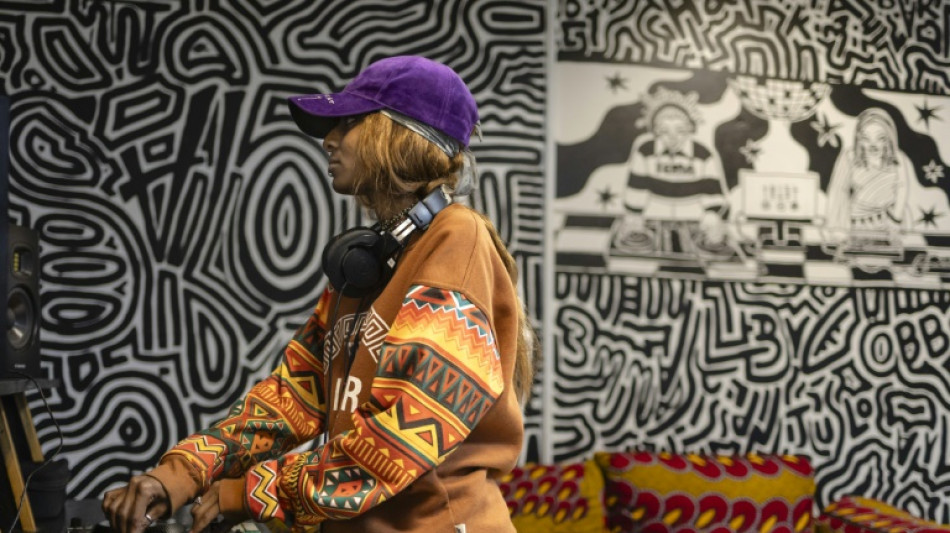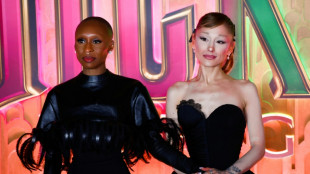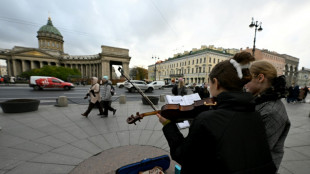
-
 Trump hosts Saudi prince for first time since Khashoggi killing
Trump hosts Saudi prince for first time since Khashoggi killing
-
Tonga's Katoa out of NRL season after brain surgery

-
 Japan warns citizens in China over safety amid Taiwan row
Japan warns citizens in China over safety amid Taiwan row
-
In Somalia, a shaky front line barely holds back the 'dogs of war'

-
 Shares in 'Baby Shark' studio jump on market debut
Shares in 'Baby Shark' studio jump on market debut
-
Thunder breeze past Pelicans, Pistons overpower Pacers

-
 Grieving Cowboys remember Kneeland, defeat Raiders
Grieving Cowboys remember Kneeland, defeat Raiders
-
Loaf behind bars: Aussie inmate says Vegemite a human right

-
 In film's second act, 'Wicked' goes beyond Broadway musical
In film's second act, 'Wicked' goes beyond Broadway musical
-
Asian markets track Wall St down with Nvidia, US jobs in view

-
 Scott Boland: the best 'spare' fast bowler around
Scott Boland: the best 'spare' fast bowler around
-
Fire and Ashes: England bank on fast bowling barrage in Australia

-
 North Korea says Seoul-US sub deal will trigger 'nuclear domino' effect
North Korea says Seoul-US sub deal will trigger 'nuclear domino' effect
-
Education for girls hit hard by India's drying wells

-
 Haitian gangs getting rich off murky market for baby eels
Haitian gangs getting rich off murky market for baby eels
-
Trump says will talk to Venezuela's Maduro, 'OK' with US strikes on Mexico

-
 Oscar Piastri wins Australia's top sports honour
Oscar Piastri wins Australia's top sports honour
-
'Severely restricted': Russia's Saint Petersburg faces cultural crackdown

-
 Polish PM denounces 'sabotage' of railway supply line to Ukraine
Polish PM denounces 'sabotage' of railway supply line to Ukraine
-
UK toughens asylum system with radical overhaul

-
 Carney's Liberals pass budget, avoiding snap Canada election
Carney's Liberals pass budget, avoiding snap Canada election
-
LeBron back in training, edges closer to Lakers return

-
 Climate talks run into night as COP30 hosts seek breakthrough
Climate talks run into night as COP30 hosts seek breakthrough
-
Germany and Netherlands lock up World Cup spots in style

-
 Germany's Woltemade hopes for 2026 World Cup spot after scoring again
Germany's Woltemade hopes for 2026 World Cup spot after scoring again
-
Germany 'send message' with Slovakia rout to reach 2026 World Cup

-
 Trump unveils fast-track visas for World Cup ticket holders
Trump unveils fast-track visas for World Cup ticket holders
-
Netherlands qualify for World Cup, Poland in play-offs

-
 Germany crush Slovakia to qualify for 2026 World Cup
Germany crush Slovakia to qualify for 2026 World Cup
-
Stocks gloomy on earnings and tech jitters, US rate worries

-
 'In it to win it': Australia doubles down on climate hosting bid
'In it to win it': Australia doubles down on climate hosting bid
-
Former NFL star Brown could face 30 yrs jail for shooting case: prosecutor

-
 Fate of Canada government hinges on tight budget vote
Fate of Canada government hinges on tight budget vote
-
New research measures how much plastic is lethal for marine life

-
 Mbappe, PSG face off in multi-million lawsuit
Mbappe, PSG face off in multi-million lawsuit
-
EU defends carbon tax as ministers take over COP30 negotiations

-
 McCartney to release silent AI protest song
McCartney to release silent AI protest song
-
Stocks tepid on uncertainty over earnings, tech rally, US rates

-
 Louvre shuts gallery over ceiling safety fears
Louvre shuts gallery over ceiling safety fears
-
'Stranded, stressed' giraffes in Kenya relocated as habitats encroached

-
 US Supreme Court to hear migrant asylum claim case
US Supreme Court to hear migrant asylum claim case
-
Western aid cuts could cause 22.6 million deaths, researchers say

-
 Clarke hails Scotland 'legends' ahead of crunch World Cup qualifier
Clarke hails Scotland 'legends' ahead of crunch World Cup qualifier
-
S.Africa says 'suspicious' flights from Israel show 'agenda to cleanse Palestinians'

-
 South Korea pledges to phase out coal plants at COP30
South Korea pledges to phase out coal plants at COP30
-
Ex-PSG footballer Hamraoui claims 3.5m euros damages against club

-
 Mbappe, PSG in counterclaims worth hundreds of millions
Mbappe, PSG in counterclaims worth hundreds of millions
-
Two newly discovered Bach organ works unveiled in Germany

-
 Stocks lower on uncertainty over earnings, tech rally, US rates
Stocks lower on uncertainty over earnings, tech rally, US rates
-
Barca to make long-awaited Camp Nou return on November 22


Kenyan women jockey for place at DJ turntables
Headphones on her head, fingers on the controls, eyes fixed on the mixing software, Kwem Kimtai strung together Afro house beats during her DJ training in Nairobi.
Kimtai gushed over the skills she learnt on the intensive four-week course at the Santuri Electronic Music Academy (SEMA), which she hopes will help her thrive in a world historically dominated by men.
"I can do everything. I can mix, I can beat-match. I can assess the energy level of music," said the 32-year-old aspiring DJ.
Established in 2021 and named after the Swahili word for vinyl, the academy sees itself as a hub for musical innovation and inclusion.
"Prior to this I was just a lover of music," said Kimtai, whose stage name is Tawa.RaR.
"But I wanted to be able to fuse different genres -- travel across different worlds."
Carving out a place in the electronic scene remains a challenge for Kenyan women.
The organisation that runs the academy interviewed dozens of artists in 2020 for a study and found women were gaining visibility as DJs in east Africa.
Yet they remained marginalised and paid significantly less than men, while music production was also male-dominated and training costs too high for many.
SEMA has since trained hundreds of people in production, mixing, DJing and other elements of the business.
Besides encouraging women and minorities to take part, the academy also raises sponsorship funding for those who need it.
"When I started DJing, I would have really liked to have had something like this because the teachers I had were all men," said DJ Shock, who was leading a class on the commercial side of the business during a visit by AFP.
She only knew two other female DJs when she started out 20 years ago, and said the men would "gatekeep" the art.
"It was a bit of a struggle to get them to share information equally," she said.
- 'Equal dopeness' -
At the back of the classroom, speakers were stacked behind a turntable, while trainees tapped away on mixing software in preparation for an imminent final presentation.
"We're the people who are going to make spaces get safer for everyone," said Daisy Nduta, 28, a recent sound engineering graduate.
She was excited to be DJing live soon under her stage name Naniwho.
Santuri organises frequent events for the students to test their skills.
"We welcome everybody the same... We put anybody prime time who we feel can do the spot well," said DJ Shock, denouncing the way clubs often relegate women to play the opening slots when audiences are sparse.
Things are rapidly improving for women who DJ in Nairobi, however.
Women are earning headline slots at major clubs while collectives like "Sirens" organise women-centric events.
That success is part of a global pattern.
Industry network "female:pressure" says the number of women performing at electronic music festivals rose from just over nine percent in 2012 to 30 percent in 2023.
In Kenya, "there are more and more female DJs coming up... They're getting more confident, which I love," said Tina Ardor, who regularly performs at Muze, a Nairobi electro mecca.
She said there was still a widespread, often unconscious, favouritism toward men.
But the SEMA course, which she did two years ago, is helping to change attitudes.
"I'm not a fan of pulling the gender card," said Ardor, hoping the scene soon gets to a point where there is "equal opportunity and equal dopeness" for everyone.
Q.Najjar--SF-PST



